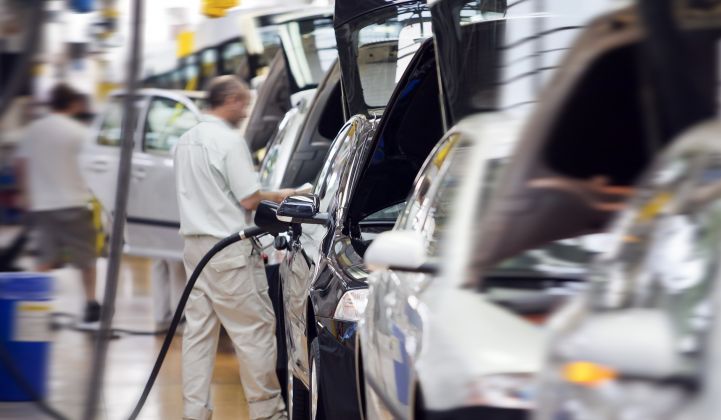An alliance of automakers, utilities and environmentalists called the 50x50 Commission released a set of policy recommendations on Tuesday that they hope will act as an “effective roadmap” to guide U.S. transportation infrastructure, said Brad Stertz, director of government affairs at Audi, a member of the coalition.
The platform, which calls for investment in and collaboration on efficient infrastructure, builds on broader recommendations the group released at the time of its founding in September. Those earlier proposals more widely aimed to cut transportation energy use 50 percent by 2050.
At the time, the group pitched their collaboration as an important step toward guaranteeing cleaner transportation initiatives with wide stakeholder buy-in. The commission includes members from the auto world like Audi and General Motors, plus efficiency advocates from the Alliance to Save Energy, utilities such as National Grid and labor union the International Brotherhood of Electrical Workers.
In its latest round of policy proposals, the group advances measures like hatching a policy fix for the Highway Trust Fund shortfall; creating a national green infrastructure bank to provide public funding for electrification, energy efficiency and renewable energy; increasing funding for the federal Vehicle Technologies Office to an annual $380 million; and forming an interagency task force to liaise between the Department of Energy, Department of Transportation, the Environmental Protection Agency and the Federal Energy Regulatory Commission on transportation policies.
Next, the group said it will seek out specific lawmakers on Capitol Hill whose offices may be interested in advancing efficient transportation or modern infrastructure policies. The current swell in interest around climate-related policies such as the Green New Deal may offer an entrance. In recent years transportation has overtaken the power sector as the largest emitter of greenhouse gas emissions in the U.S., according to the EPA.
“The climate impact of what we’re talking about would be enormous,” said Natasha Vidangos, vice president of research and analysis at the Alliance to Save Energy. “I think there’s an accelerating appreciation for how important the transportation sector is for us to address the increase in our climate emissions. Making a transportation system function more efficiently is really a great proxy for reducing emissions.”
The policy platform also comes as the Trump administration is working to officially roll back fuel emissions standards. That may lead to a bifurcated U.S. market, if California and states that follow its stricter standards are allowed to continue to do so, or if U.S. standards are imposed that are much less stringent than those in international markets. Last week, 17 auto companies sent the administration a letter asking for a “unified standard” that would provide business certainty (in the past automakers had lobbied for weaker standards, but then backtracked).
While Vidangos said the Alliance to Save Energy is “extremely concerned” about plans for those standards, she added that “there are so many other ways that our policies shape how we efficiently use the transportation sector.” The platform put forth by the group and endorsed by some (but not all) members of the 50x50 Commission aims to provide “high-level principles” to push lawmakers toward efficient and electrified transport. The Green New Deal, for instance, calls for “overhauling transportation systems” and “clean, affordable and accessible public transit” but leaves room for a variety of specific policies to meet those goals.
“This particular policy proposal is really trying to get into the weeds. [...] As a person in the toolshed of federal policy, how do you enact those kinds of changes that can make the transportation sector more efficient?” said Vidangos. “We really view this as exactly the kind of next-step conversation that we need to have.”




